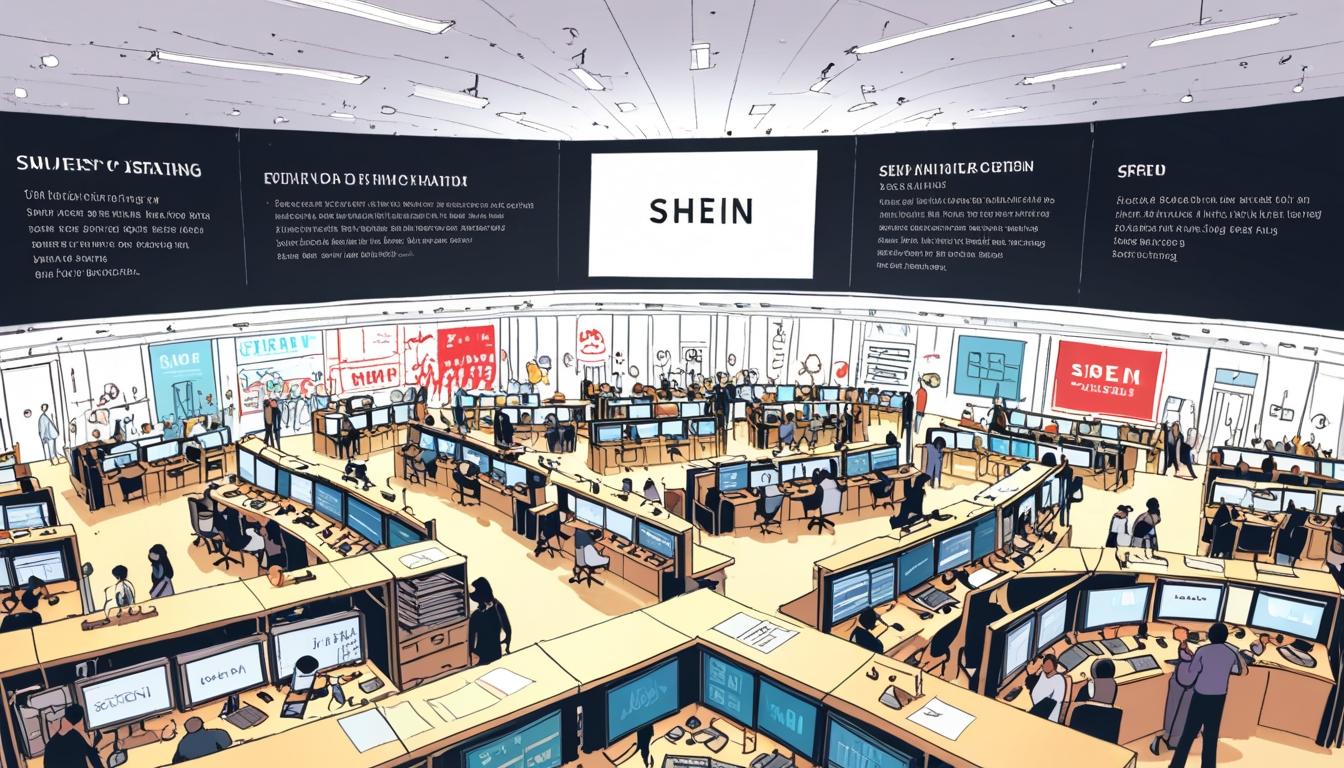Shein is set to launch its IPO on the London Stock Exchange, raising questions about its business practices and sustainability amid heightened scrutiny.
Shein, the Chinese-founded fast fashion retailer, is poised to launch its initial public offering (IPO) on the London Stock Exchange (LSE), following preliminary approval from the Financial Conduct Authority (FCA) on Friday. This IPO, if it goes ahead, could potentially eclipse any other flotation seen on European markets in the past year, which would be a significant boon for the LSE. The market has faced challenges attracting new listings recently, with some companies opting to pursue opportunities on other exchanges. Consequently, the anticipated listing of Shein has drawn attention from various stakeholders, including the UK government and proponents of the City of London, who are keen to bolster the attractiveness of the LSE.
Despite the excitement surrounding the flotation, concerns about Shein’s operational practices and business model persist. The company’s founder, Chris Xu, relocated both himself and the company’s headquarters to Singapore in 2022, amid rising scrutiny. One point of contention arose earlier this year when Shein’s legal representative struggled to confirm to the UK’s business and trade parliamentary committee whether the company sources cotton from China. Advocacy group Stop Uyghur Genocide has stated its intention to pursue a judicial review if the FCA grants approval for the LSE listing.
In conversations surrounding the IPO, some industry observers have questioned the implications of such a controversial listing. There are significant concerns regarding the company’s environmental, social, and governance (ESG) credentials. Shein claims to be making efforts to lessen its environmental impact; however, its business practice involves selling inexpensive clothing that consumers are likely to discard after minimal use, raising questions about sustainability initiatives.
Labour practices within Shein’s supply chain have also come under fire, particularly concerning the treatment of workers. Although the company announced in the previous year its commitment to improving supplier practices and asserted that it strictly prohibits forced labour in its supply chain, apprehensions linger regarding how effectively these commitments translate into actual enforcement.
If Shein proceeds with a flotation of less than 10 percent of its equity, the company will largely remain under the control of its founders and majority shareholders, much as it would as a private entity. Generally, an LSE listing would demand that a company either follows the UK corporate governance code or provides a rationale for any deviations. However, minority investors, collectively owning less than 10 percent, would have limited influence over governance decisions, leading to additional concerns regarding shareholder rights.
Amidst these complexities, questions arise regarding who stands to benefit or suffer from the proposed IPO. For Shein, the motivation behind the listing includes raising capital for investment, offering founders a chance to realise profits, easing the pathway for potential mergers, and attracting employees by providing share purchase incentives. A successful listing could also portray the UK as a forward-thinking and desirable destination for business, generating initial financial inflow for the LSE and substantial fees for associated financial and legal institutions based in London.
However, the shift from a private entity to a publicly traded company would require Shein to disclose its financial conditions and legal liabilities, which may not sit well with its current operations marked by reticence around financial transparency. Recent evaluations position Shein’s equity valuation between $50 billion and $66 billion. Concerns about the possible repercussions of negative disclosures—ranging from forced labour allegations to labour conditions—could severely affect the company’s market performance.
A cautionary parallel can be drawn with Boohoo.com, a UK-based fast fashion counterpart. This firm, once valued above £5 billion, has seen its stock plummet to approximately £400 million following reports of labour abuses in its supply chain. Boohoo’s struggles underscore the potential volatility that Shein might encounter should links to controversial practices come to light.
The forthcoming IPO of Shein, should it proceed, would subject the company to a level of public examination and accountability it has not previously faced. As discussions about fast fashion intensify, perceptions of Shein’s business practices could shape broader dialogues regarding the fast fashion industry’s ethical landscape. Isaac T. Tabner, a Senior Lecturer in Finance and the Director of the MSc Finance programme at the University of Stirling, has noted the significance of this heightened scrutiny as the fast fashion sector continues to attract attention.
Source: Noah Wire Services
- https://thebambooworks.com/brief-shein-london-ipo-approved-by-british-financial-regulator/ – This URL supports the claim that Shein has received approval from the British financial regulator for its London Stock Exchange listing, marking a significant step towards its IPO goal. It also discusses the company’s background and valuation.
- https://www.independent.co.uk/business/shein-london-listing-ipo-b2731613.html – This URL provides details on Shein’s progress towards a London IPO, including the FCA approval and the need for additional regulatory clearances from China. It highlights the company’s global reach and its previous valuation.
- https://technode.com/2024/11/20/shein-plans-london-stock-market-ipo-in-2025-report – This URL corroborates Shein’s plans for a London Stock Exchange IPO in 2025, noting its expected valuation and the involvement of major investment banks. It also touches on the significance of this IPO for the London market.
- https://www.cxnetwork.com/cx-experience/news/shein-ipo-cx-stock-price – This URL supports Shein’s efforts to list on the London Stock Exchange, highlighting the company’s business model and its previous plans for a New York listing. It discusses concerns over labor practices and the potential impact of the IPO.
- https://mexicobusiness.news/ecommerce/news/shein-wins-uk-approval-london-ipo-awaits-china-nod – This URL confirms Shein’s receipt of UK approval for its London IPO while emphasizing the need for additional clearance from Chinese regulators. It outlines the current state of the company’s listing process.
Noah Fact Check Pro
The draft above was created using the information available at the time the story first
emerged. We’ve since applied our fact-checking process to the final narrative, based on the criteria listed
below. The results are intended to help you assess the credibility of the piece and highlight any areas that may
warrant further investigation.
Freshness check
Score:
9
Notes:
The narrative mentions recent events, such as Shein relocating its headquarters to Singapore in 2022, and current discussions around the IPO, indicating that it is relatively fresh. However, it does not specify the exact date of publication.
Quotes check
Score:
5
Notes:
There are no direct quotes provided in the narrative. The mention of Isaac T. Tabner’s viewpoint is referenced but does not include a specific quote that can be verified.
Source reliability
Score:
6
Notes:
The narrative does not specify its original source, but it appears to be compiled from various news sources. It discusses known concerns and figures like Shein’s founder Chris Xu and financial experts, suggesting a level of reliability. However, without a clear source attribution, certainty is reduced.
Plausability check
Score:
8
Notes:
The claims about Shein’s IPO and concerns regarding its business practices are plausible given current trends in fast fashion and recent discussions around ethical supply chains and financial transparency.
Overall assessment
Verdict (FAIL, OPEN, PASS): OPEN
Confidence (LOW, MEDIUM, HIGH): MEDIUM
Summary:
The narrative discusses plausible and timely concerns regarding Shein’s IPO on the London Stock Exchange. However, without a specific publication date or original source, and given the lack of direct quotes, the assessment remains open. The reliability is medium due to known circumstances around Shein and discussions in the fast fashion industry.













